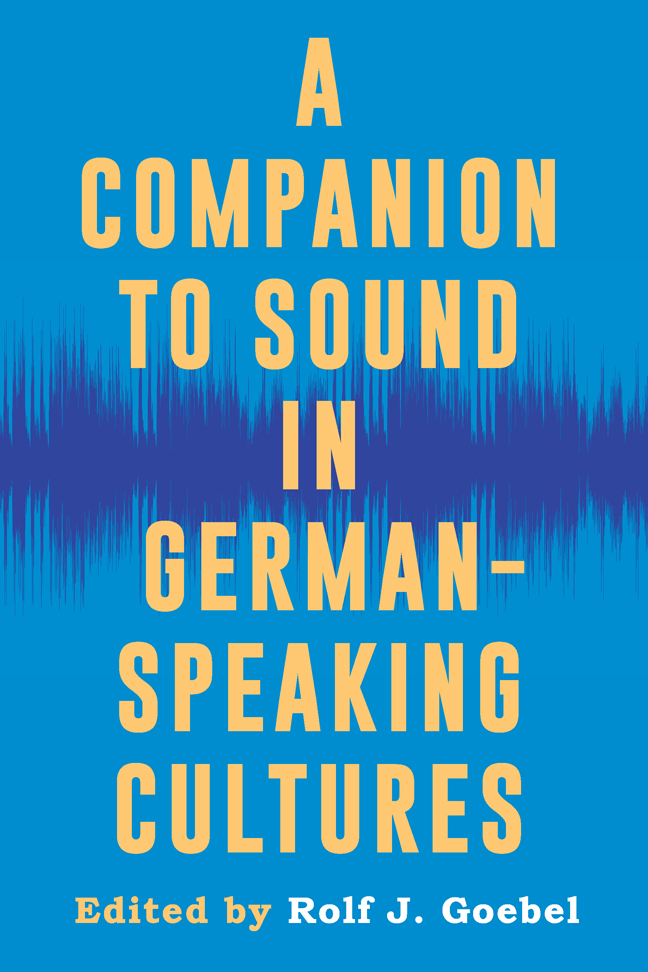Book contents
- Frontmatter
- Contents
- List of Illustrations
- Preface
- Introduction
- Part I Sonic Practices from the Middle Ages to the Nineteenth Century
- Part II Rediscovering the Sounds of Modernism
- Part III Listening to the Unbearable: The Sounds of National Socialism and the Holocaust
- Part IV After the Catastrophe: Sounds in Postwar Germany and Beyond
- Part V Sounds of the Present
- Part VI Epilogue
- Select Bibliography and Further Reading
- Notes on the Contributors
- Index
16 - (Post)Digital Sounds: Acoustic Experiments in the Age of Algorithmic Processes
Published online by Cambridge University Press: 21 February 2024
- Frontmatter
- Contents
- List of Illustrations
- Preface
- Introduction
- Part I Sonic Practices from the Middle Ages to the Nineteenth Century
- Part II Rediscovering the Sounds of Modernism
- Part III Listening to the Unbearable: The Sounds of National Socialism and the Holocaust
- Part IV After the Catastrophe: Sounds in Postwar Germany and Beyond
- Part V Sounds of the Present
- Part VI Epilogue
- Select Bibliography and Further Reading
- Notes on the Contributors
- Index
Summary
Digital Sound Comprises a huge variety of phenomena spanning digital transformations from the spoken word to sound generation experiments with artificial intelligence. This contribution will discuss the work of the Austrian sound poet Jörg Piringer, who has been working with digital technologies since 1997. His acoustic art mirrors the multiple directions in which digital sound has developed and can therefore serve as a model for discussing its diverse aesthetic dimensions.
I. The Long Shadow of the Avant-gardes
The history of computer-based experiments with sound is deeply inter-woven with the avant-garde movements at the beginning of the twentieth century. Futurism and Dadaism freed the poetic word from its close rela-tion to the printed book and rediscovered the power of sound and spo-ken language. Works like Kurt Schwitter's Ursonate, the sound poems of Hugo Ball, and the optophonetic experiments of Raoul Hausmann realize the aesthetic program of de-semantizing the meaningfulness of word-based poetry, but they also emphasize the acoustic quality of lan-guage when concentrating on pure sound. Furthermore, they transfer the abstract character of written/printed poetry, whose sensory quality is either purely visual or combined with a sound that cannot be heard but has to be imagined by the reader in a new corporeality. The authors invented an impressive variety of sound performances that are interwo-ven with the materiality of the body and the voice apparatus. Their rela-tion to the new technologies of sound recording was not as close as one could have expected from an avant-garde movement, but at least Raoul Hausmann invented a new apparatus, which he called “optophon,” capable of transforming sound into light. This technical transforma-tion process of sound into light has quite a tradition, beginning with the invention of the color piano in the eighteenth century. Thus it might be no coincidence that prior to Hausmann's optophone-idea a major audio-visual work had its world premiere: Victor Scriabin's Prometheus (1910).
When, seventy years later, the Austrian avant-garde writer Franz Mon refers to Kurt Schwitters, Hugo Ball, and Raoul Hausmann as predeces-sors of concrete poetry in an interview led by Michael Lentz, he might have had in mind these three decisive expansions of poetry: the liberation of the word from its conventional meaning, the emphasis on the acoustic qualities of language, and the idea of the “technologizing of the word” by using or building electric/electronic apparatuses.
- Type
- Chapter
- Information
- A Companion to Sound in German-Speaking Cultures , pp. 256 - 268Publisher: Boydell & BrewerPrint publication year: 2023



